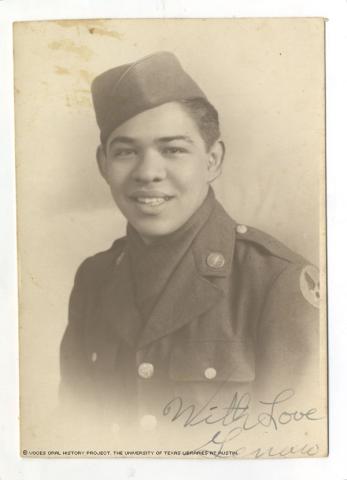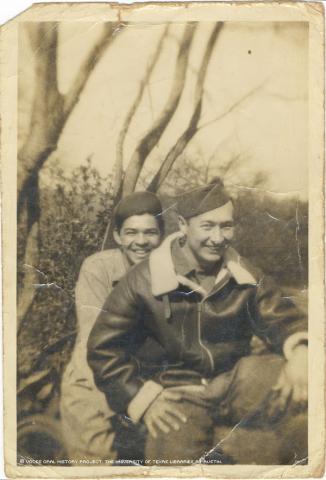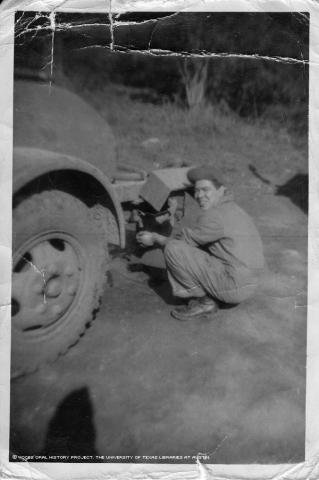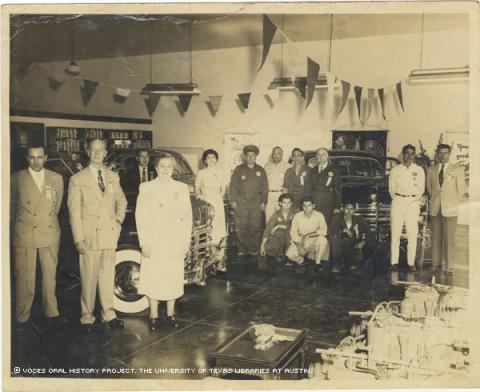



By Simon Wagner, St. Bonaventure University
World War II "actually made a man out of me," Genaro V. Lopez told his son, Genaro, during their father-to-son interview for the Voces Oral History Project.
Born April 8, 1925, in Brownsville, Texas, to Manuel and Angela Velazco Lopez, Lopez was the middle child among four brothers and two sisters. His father drove a truck for a greengrocer and was known as "El Gallo" for his sideline as a cockfighter.
Lopez's father expected him to clean the roosters' cages.
"He had about 20, maybe more," Lopez said. "He treated me like hell. I was stubborn and hardheaded."
Lopez recalled the difficulties of growing up during the Great Depression. "Luckily, we had a good neighbor," he said, referring to an Anglo family that helped his family out. "They gave us bread and butter."
Lopez was working in automotive parts distribution with the Brownsville Motor Co. when he entered the Army Air Force on May 20, 1943. He did basic training at Fort Hood, Texas.
"Mostly they taught us how to defend ourselves with a bayonet; they set us up for target practice," he said. Target practice ended in one of two ways: "They rated us either a sharpshooter or a marksman. I was a marksman."
He was sent to North Africa as a member of the 708th Air Material Squadron, as part of the glider infantry.
Lopez says his unit was eventually taken to Normandy Beach by gliders and dropped off with the 82nd Airborne Division.
"About a dozen, twelve of us" were on each glider, he recalled. In North Africa, he achieved the rank of corporal; when he got to Normandy, he was upgraded to sergeant.
During the Battle of Normandy, he "didn't have time to think about anything except get in the damn foxhole and save your life."
Holding back tears, Lopez recalled losing a friend at Normandy. "About halfway, they killed Paco. It made me very mad, made me cry, made me angry."
Clearly shaken, Lopez began to talk about the French family who took him into their home and treated him as though he were a member of the family.
"I made friends with a French soldier, and he invited me to the house," he said. "Instead of staying at camp, I stayed at the house."
Lopez, who also served during the Battle of Rhineland, recalled another incident.
"Three miserable days without food, water or ammo. They had us completely surrounded," he said, referring to the German forces.
Lopez remembered a drop was organized to supply the troops with food, water and ammo.
"Nobody touched the food or water," Lopez said. He added that the priority of the troops was to fight and defend themselves before they went for the supplies.
Lopez spared the life of an enemy soldier he could have easily ended with his bayonet. "There was this young German boy, a kid about 18 or 19. I don't think he was 20. He was lying there. I thought, 'Ah, shit. I'm not gonna kill this poor bastard," he said. "I saved his life and kept going."
Lopez was later injured in the Siege of Bastogne. A German soldier's bullet hit him in the knee.
"I just got shot, and the medics came in and started patching me up," he said. But Lopez said he was able to shoot back at the man who wounded him. "I kept watching where I thought the bullet came, saw a helmet and shot right between the eyes. I killed that son of a bitch."
"I thought truly they were gonna send me to the back line." Lopez was wrong; he was sent back to the front lines.
Lopez, who was honorably discharged at Camp Chaffee, Arkansas, on March 12, 1946, received the Bronze Star, the World War II Victory Medal and the European Theater of Operations Ribbon.
While he did not immediately receive a Purple Heart in recognition of the injuries he sustained while serving the country, his son Genaro Lopez wrote in an email to Voces that the family had contacted U.S. Rep. Filemon Vela Jr., D-Texas, to make an official request for the award.
After the war, Lopez married Carmen Coronado in Our Lady of Guadalupe Church in Brownsville. The couple had four sons: Genaro, Esteban, Ruben and Jose, as well as four daughters: Sylvia Saenz, Rosa Trevino, Angela Pena and Ida Diedrich.
Back in civilian life, Lopez supported his family by working as an automotive parts manager at various companies.
At the time of his interview, Lopez was a member of the VFW Post in Weslaco, Texas.
Mr. Lopez was interviewed in Weslaco, Texas, on Aug. 25, 2012, by Genaro Lopez.

